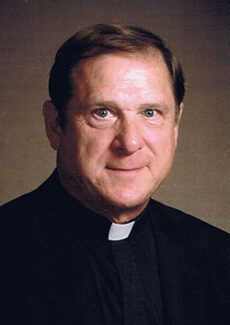After experiencing Divine Mercy, we must become instruments of it

Father R. Michael Schaab
By Father R. Michael Schaab
Second Sunday of Easter (Sunday of Divine Mercy) / April 11
Acts 4:32-35; Psalm 118:2-4,13-15,22-24; 1 John 5:1-6; John 20:19-31
As one reads this Sunday’s Responsorial Psalm,
“Let the house of Israel say, ‘His mercy endures forever.’”
“Let the house of Aaron say, ‘His mercy endures forever.’”
“Let those who fear the Lord say, ‘His mercy endures forever.’”
it becomes obvious why the Church has named this Second Sunday of Easter the Sunday of Divine Mercy.
But this Liturgy of the Word also contains an ancient set of readings that are for post-baptismal catechesis, the continued instruction of the newly baptized who had entered the Church at the Easter Vigil just eight days before. Some of the greatest sermons that have come down to us from the early Church were preached to instruct the newly baptized. Of course, they were preached to also instruct the faithful who are always in need of continuing catechesis, which opens us to the ramifications of what we say we believe.
For instance, the first reading from the Acts of the Apostles demonstrates how our belief in the unity of the Church was lived out in that first generation of Christians. “The community of believers was of one heart and mind, and no one claimed that any of his possessions was his own, but they had everything in common.” The newly baptized were taught that what they believed in their hearts and confessed with their lips had to be lived out in daily decisions to share what they owned. It’s a lesson all Christians must learn about stewardship and about applying our belief in the oneness of all believers.
HEARTS FILLED TO OVERFLOWING
This idea of unity is explained even more deeply in the second reading from the First Letter of John. The newly baptized had come into the Church professing their love for God and for God’s Son Jesus Christ. Now they are faced with the fact that this love must be extended to all “the children of God.” This message of the unity of love must have been a shock to the “neophytes,” as the newly baptized were called, as they realized that their newfound faith was supposed to make a difference in how they looked upon both friend and foe. There was a union between loving God and loving our brothers and sisters.
But just in case this message might be so overwhelming that they began to despair of ever achieving the goal of the Christian life, the neophytes were reminded that they were already victors over the world just as Jesus is. Furthermore, they share in this victory through the water of their baptism, through the blood of Christ on Calvary and in the Eucharist, and through the Spirit of God that dwells in their hearts. And it is the Spirit of God that is truly the key to these readings.
Recall that in the Responsorial Psalm we said, “I was hard pressed and was falling, but the Lord helped me,” as we reflect on the doubting Thomas who is held up in the Gospel as an example of God’s mercy. The neophytes could certainly identify with Thomas since they were “hard pressed and falling” as they faced their own doubts about living out the Christian vocation. In their doubt they heard Jesus speak to them as well as to Thomas when He said, “Peace be with you.” No condemnation, no anger, no retribution — just peace, forgiveness and Divine Mercy.
As those early Christians received the gift of God’s mercy, they could hardly believe how much they were loved. But the catechesis wasn’t complete. The Gospel had more to add, and it was this: “Receive the Holy Spirit. Whose sins you forgive are forgiven them.” They who were forgiven by God’s mercy are now empowered to be instruments of Divine Mercy in this world.
In leaving Mass after the Easter Vigil in which they had come into the Church, they felt that they could never be happier or more filled with joy. But a week later, as they leave Mass, they are even happier and their joy spills over into the world as Divine Mercy fills their hearts to overflowing.
—
FATHER R. MICHAEL SCHAAB is a senior priest of the Diocese of Peoria who gives retreats and days of recollection, and who fills in as presider at parish Masses on weekends. He resides on a hobby farm in Putnam County.





